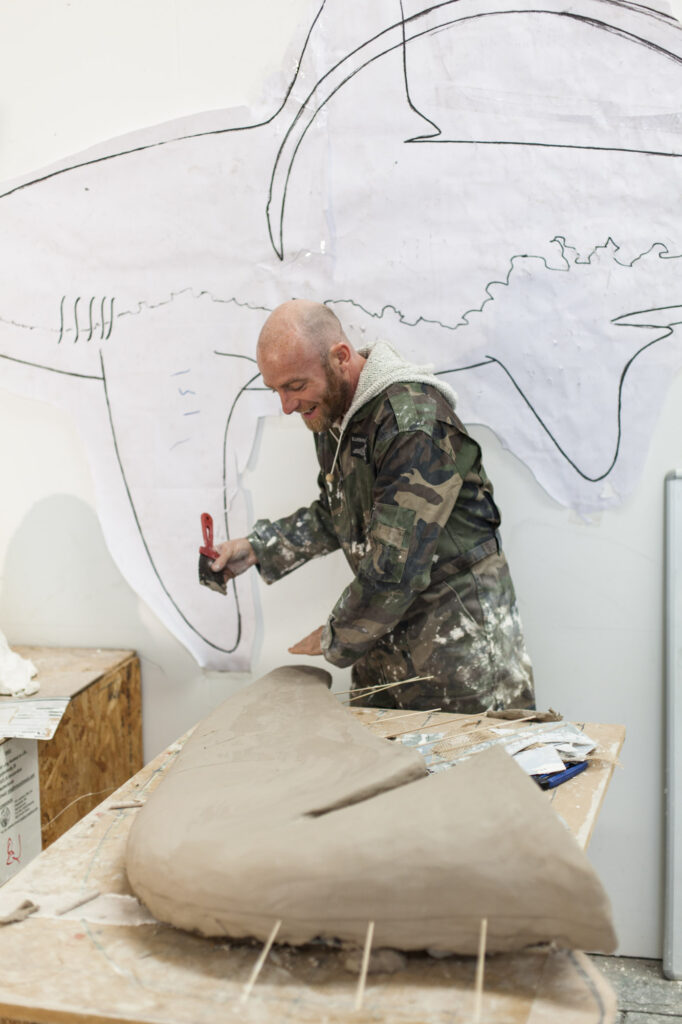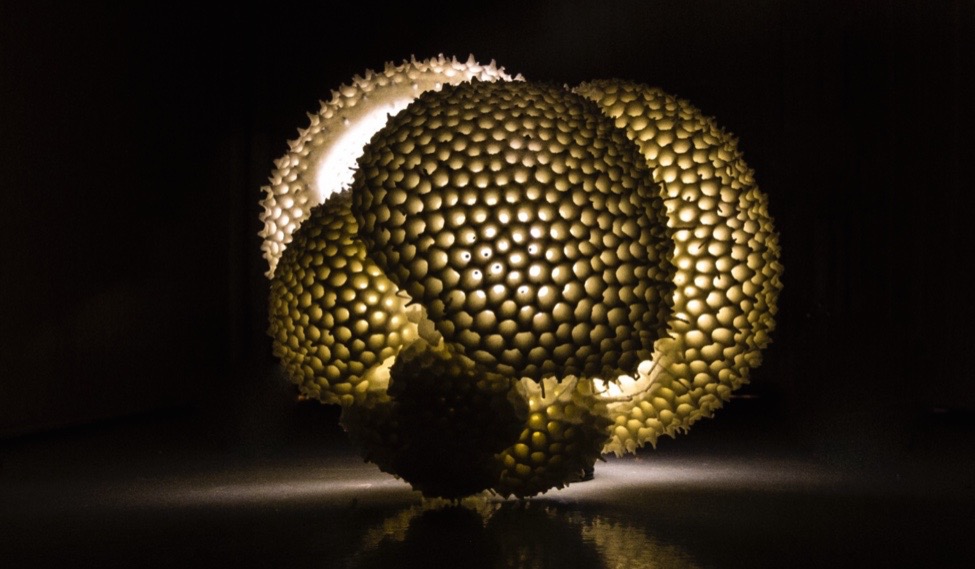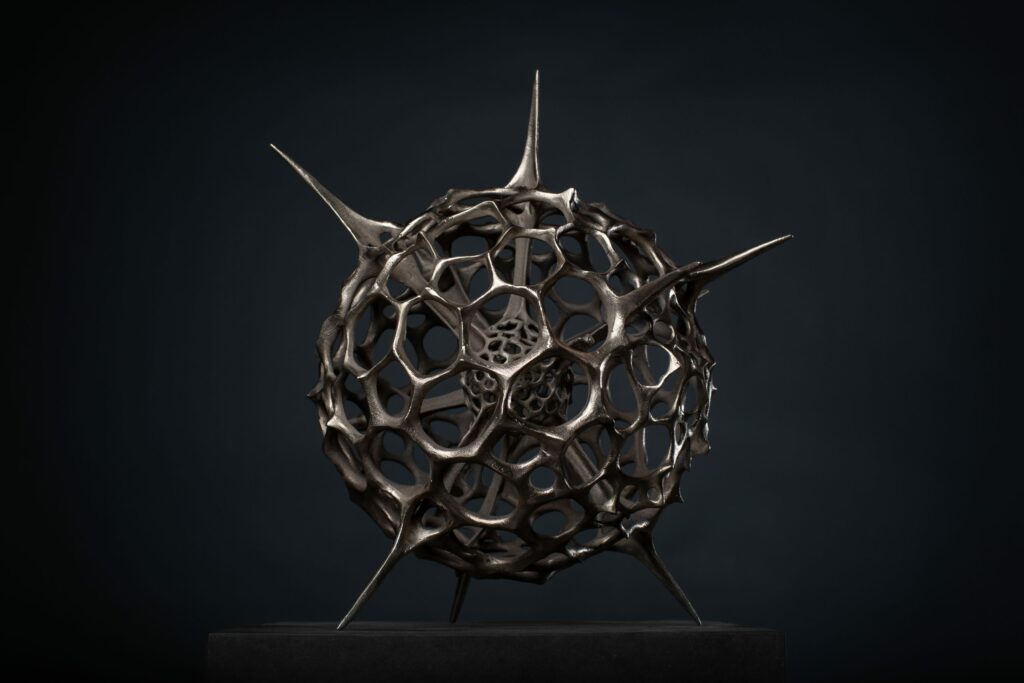Visual artist Vincent Mock (1980) won the Van Vlissingen Art Foundation Prize in 2016. For his inspiration trip, Vincent chose to return to South Africa, the country where his career began. There, he dove into the ocean to meet his first love, the shark.
Part of the Inspiration series, the book featuring his work entitled, Vincent Mock on the Cape, was written by Edo Dijksterhuis and published by Waanders. Vincent’s work was on display between 20 May and 22 May 2016 during a pop-up exhibition in Beelden aan Zee.
Vincent Mock is a visual artist from Amsterdam. Vincent was fascinated by nature at an early age; from the African wilderness to the depths of the ocean, nature has remained an important source of inspiration for his work. Vincent’s role as a nature activist, and the accompanying responsibility thereof, is the common thread in his work. Life-sized sculptures of endangered marine animals, a bloated molecule representative of our spirituality, and the golden skull of a poached rhino, are just a few of the ways through which he communicates his ideas on the world we live in.
Whether he depicts the ephemerality of life on Earth or questions the complexity of human consciousness, Vincent does not allow us to rest easy. He stimulates the imagination and reminds us of our dependence on nature and the connection we are in danger of losing.
Mock has traveled extensively and lived in various places around the world. He has lived and worked in Mozambique, Tanzania and South Africa. After studying marketing and philosophy, Vincent spent time in the African wilderness. Vincent earned his diving license in Mozambique and became inspired by the sharks and mantra rays inhabiting the underwater world.
Vincent also worked in a ‘rhinopark’ in Limpopo province in Marakele National Park. Here, Mock cared for the rhinos. Rhinos were regularly moved to other places in order to spread the population. During the time that he lived there (2008), not many rhinos were being hunted by poachers. This is no longer the case. The number of rhinos hunted has increased dramatically in the last 10 years.
After years of working as a conservationist in Africa, Vincent decided to put his artistic talents to use in service of that which he had so long worked to protect . Returned from Africa, Mock began to use art as a medium to tell his story and convey the impact of his experiences. The self-made artist not only depicts the power and beauty of nature with his sculptures, but also emphasizes the need for a radical change in human behavior towards nature. His work allows him to communicate his message, follow his passion and live as an artist.
Mock chose to return to South Africa for his inspiration trip—the place that birthed his career. There, he dove into the ocean to meet his first love, the shark. He has been obsessed with these magnificent monsters of the deep his whole life. The opportunity to swim with large groups of oceanic blacktip sharks (measuring three meters) at Aliwal Shoal in KwaZulu Natal, was his own personal seventh-heaven. Vincent: “With the curiosity and enthusiasm of young dogs they circle around you and sometimes swim up to you. You never forget that. In Africa you rediscover how incredibly beautiful nature can be and realize that humanity has an almost immeasurable task ahead of it in order to be able to live in harmony with nature again.”

Vincent Mock is a visual artist from Amsterdam. Vincent was fascinated by nature at an early age; from the African wilderness to the depths of the ocean, nature has remained an important source of inspiration for his work. Vincent’s role as a nature activist, and the accompanying responsibility thereof, is the common thread in his work. Life-sized sculptures of endangered marine animals, a bloated molecule representative of our spirituality, and the golden skull of a poached rhino, are just a few of the ways through which he communicates his ideas on the world we live in.
Whether he depicts the ephemerality of life on Earth or questions the complexity of human consciousness, Vincent does not allow us to rest easy. He stimulates the imagination and reminds us of our dependence on nature and the connection we are in danger of losing.
Mock has traveled extensively and lived in various places around the world. He has lived and worked in Mozambique, Tanzania and South Africa. After studying marketing and philosophy, Vincent spent time in the African wilderness. Vincent earned his diving license in Mozambique and became inspired by the sharks and mantra rays inhabiting the underwater world.
Vincent also worked in a ‘rhinopark’ in Limpopo province in Marakele National Park. Here, Mock cared for the rhinos. Rhinos were regularly moved to other places in order to spread the population. During the time that he lived there (2008), not many rhinos were being hunted by poachers. This is no longer the case. The number of rhinos hunted has increased dramatically in the last 10 years.
After years of working as a conservationist in Africa, Vincent decided to put his artistic talents to use in service of that which he had so long worked to protect . Returned from Africa, Mock began to use art as a medium to tell his story and convey the impact of his experiences. The self-made artist not only depicts the power and beauty of nature with his sculptures, but also emphasizes the need for a radical change in human behavior towards nature. His work allows him to communicate his message, follow his passion and live as an artist.
Mock chose to return to South Africa for his inspiration trip—the place that birthed his career. There, he dove into the ocean to meet his first love, the shark. He has been obsessed with these magnificent monsters of the deep his whole life. The opportunity to swim with large groups of oceanic blacktip sharks (measuring three meters) at Aliwal Shoal in KwaZulu Natal, was his own personal seventh-heaven. Vincent: “With the curiosity and enthusiasm of young dogs they circle around you and sometimes swim up to you. You never forget that. In Africa you rediscover how incredibly beautiful nature can be and realize that humanity has an almost immeasurable task ahead of it in order to be able to live in harmony with nature again.”

